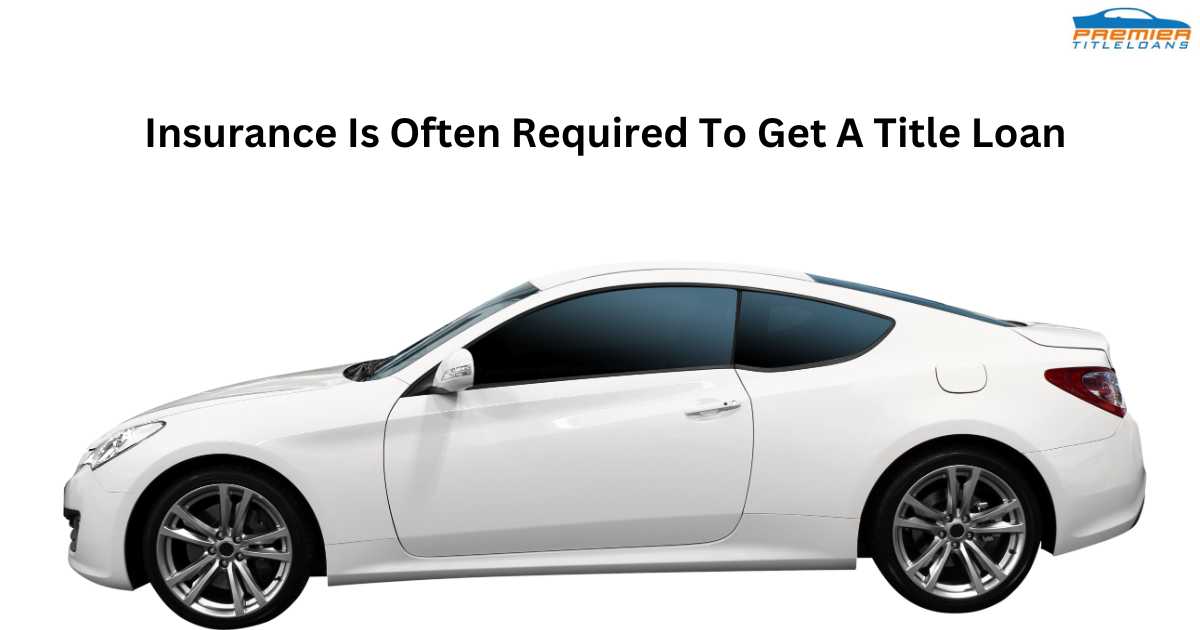Car Title Loans Without Insurance – Are They Possible
Title loans usually require collateral, which includes your vehicle and, usually, car insurance. A lender must be assured that the vehicle they’re putting a lien on will be protected against losses or damage since that vehicle is their collateral. If you don’t have car insurance, it’s creating a big risk for the lender, plus not having insurance could violate loan agreement terms or be illegal in your jurisdiction.
If you’re interested in a title loan with no insurance, it is possible, but it’s harder to find a lender who will work with you if your car isn’t insured.
How Does Car Insurance Work With A Title Loan?
When you insure a vehicle, a contract is created between you and your insurance company. You pay a premium; in return, an insurer provides financial protection against certain types of damage, vehicle loss, or liability if you’re responsible for injuries or damages to others.
You purchase a policy from an insurance company that outlines the coverage you’re buying, the premium you’ll pay, and the terms and conditions.
Car insurance can include the following types of coverage:
- Liability coverage covers you if you’re in an accident and you cause damage or injuries to someone else.
- Collision coverage is for vehicle damage if you hit another car or object.
- Comprehensive coverage is for vehicle damage from something other than a collision, like theft or vandalism.
- Uninsured/underinsured motorist coverage is for expenses that you might face if you’re in an accident caused by someone else without insurance or enough coverage for all the damages.
- Personal injury protection, also known as no-fault coverage, includes medical expenses and other costs that could stem from an accident, regardless of who was at fault.
You pay your premium to your insurance company monthly, quarterly, semi-annually or annually, and that amount is based on things like your driving record and age.
You can file a claim with your insurer if you are in an accident or your vehicle sustains damage. At that point, the insurance company will evaluate your claim, and if it’s approved, they’ll either pay for repairs directly to a shop or reimburse you for the costs minus your deductible.
Your insurance will usually extend for a period of time, like six months or a year. You’ll have the option to renew before your policy expires.

Do You Need Insurance to Get a Title Loan?
To go back to the original question of whether you can pawn a car title without insurance, the answer is generally no because the insurance protects the lender. If you use your vehicle as collateral, the lender has a financial interest until a loan is paid in full. Similar to if you wanted a title loan with an out of state lender or a title loan buyout of $5,000 or more, these loans can be tough to qualify for, and it makes sense to take time and get full insurance coverage on the vehicle.
If your vehicle were to be damaged, insurance would reassure the lender that their investment is protected. Many states also have laws requiring vehicles to be insured. Lenders might require insurance to protect themselves legally and comply with relevant laws.
Some lenders offering title loans online will outline specific requirements to their borrowers, including maintaining insurance coverage throughout their loan duration.
Additionally, if a vehicle is damaged without insurance, its value can diminish. That leaves a lender with a less valuable asset if they need to repossess and sell it to get their money back if the borrower defaults on the loan.
If You Don’t Have Insurance, How Can You Get a Title Loan?
While it’s pretty difficult and not possible in some jurisdictions, in others, you may be able to get a title loan with no insurance.
You would have to find a lender willing to work with you. Some lenders have flexible requirements, and others might specialize in working with borrowers who don’t have insurance.
Outside of those options, others, if you need a loan quickly, would be to use alternative collateral like valuable personal belongings or obtain car insurance.
What If You Have a Title Loan and Get into An Accident?
If you get into an accident, your vehicle has a title loan on it, and you also have insurance, the handling of insurance proceeds can depend on your loan agreement, the extent of the damage, and your insurance coverage.
Generally, if you’re at fault in an accident, your liability insurance covers damage to the other party’s vehicle and any injuries they have. Liability coverage is separate from your title loan agreement and, in most places, is legally required.
If you have collision or comprehensive coverage, it may cover damage to your vehicle regardless of who is at fault.
After an accident, you file a claim, and the insurance company investigates. If your insurer approves your claim, it will pay you directly or send the funds to a repair shop.
Since your vehicle is loan collateral, your lender may require you to handle insurance procedures in a certain way. Some lenders could require you to use the insurance payout to repair the vehicle, but others might not have this requirement.
You must communicate with the title loan lender about the accident and the insurance claim process. Depending on the extent of the damage and insurance payout, you’re still likely to be responsible for paying off your title loan, even if your vehicle is damaged or totaled.
Final Thoughts About Insurance Requirements For A Title Loa
While getting a title loan without insurance is technically possible, it’s not common. Insurance protects the title loan company’s collateral, which is why it’s often required.
If you want to explore your funding options, contact Premier Title Loans online or call 800-250-6729!

Jessica has been working in the title loan lending industry since 2012. Before that, she managed a team of customer service representatives for one of the largest payday loan companies in the US. Since coming to Premier Title Loans, she’s overseen our sales and marketing department and looks forward to educating consumers on their different financing options. Jessica is always open to feedback and questions related to short term loans!
